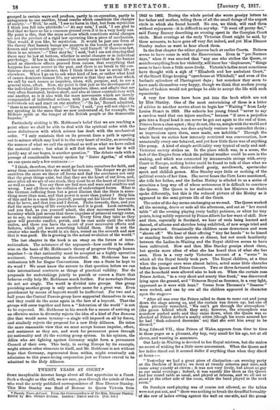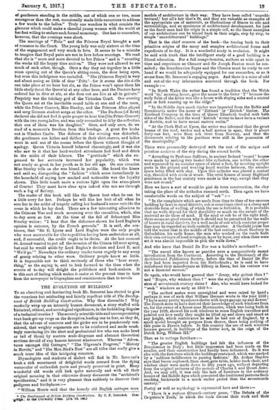TWENTY YEARS AT COURT.•
SOME inexplicable interest hangs about all that appertains to a Court. Such a thought as this will, we are sure, pass through the minds of those who read the newly published correspondence of Miss Eleanor Stanley. This Miss Stanley was Maid of Honour to Queen Victoria from • Tematy Fears at Court. From the Correspondence of the Ron. Eleanor Stanley. Edited by Mrs. Steuart Erskine. London : Nisbet and Co. (15s. net.1 1842 to 1882. During the whole period she wrote gossipy letters to her father and mother, telling them of all the small doings of the august circle in which she found herself. No one, we think, will read them without enjoyment—it is difficult to say why. "It went off pretty flat," said Fanny Burney describing an evening spent in the Georgian Court circle. Most evenings at the early Victorian Court might be said, by those accounts, to have gone off very flat indeed, and yet Miss Eleanor Stanley makes us want to hear about them.
In the first chapter the editor glances back at earlier Courta. Dulness seems to have come in with the Hanoverians. Even in " pro-Norman days," when it was enacted that " any one who strikes the Queen, or snatches anything from her violently, will incur her displeasure,'" things seem to have been a little more lively. Victoria's ladies must sometimes have thought with a sigh of " Elizabeth and her ambulant Court," of the Stuart Kings keeping "open house at Whitehall," and even of the barbaric splendour of Plantagenet days ; but somehow they seem to have made themselves very happy, though we think that modem young ladies of fashion would not perhaps bo able to accept tho life with such equanimity.
A very few letters have been put into the book which are not by Miss Stanley. One of the most entertaining of these is a letter of advice to another novice about to begin her " Waiting " from Lady Louisa Stuart in 1839. She exhorts her young friend "never to say a careless word that can injure another," because "if once a prejudice gets into a Royal head it can never be got out again to the end of time. Princes form a class apart ; they do not, like us, mingle with the world and hear different opinions, nor does anybody venture to contradict theirs ; so impressions upon them, once made, are indelible." Through the whole book we notice how intensely restricted was conversation, how unnaturally every one behaved, and yet how little there was of anything like pomp. A kind of simple artificiality very typical of early and mid- Victorian society strikes us. In the place which was, in a sense, the hub of the Empire from which the political weather could be seen in the making, and which was connected by innumerable strings with.every Court in Europe, nothing better could be found to talk of than what we may call fancy art, thrice-refined gossip, needlework, spectacular sport. and childish games. Miss Stanley says little or nothing of the political events of her time. She never hears the Corn Laws mentioned, she tells her father, and the Indian Mutiny is alluded to as a series of atrocities a long way off of whose seriousness it is difficult to convince the Queen. The Queen in her audience with her Ministers no doubt spoke differently, but this is the reduced picture of the Mutiny as it appeared to the semi-private life of the Court.
The order of the day seems unchanging as we read. The Queen worked all the morning, drove or rode all the afternoon, and sat at " her round table " all the evening playing (very badly) patience, or whist for tiny points, being mildly reproved by Prince Albert for her want of skill. Now and then, especially in Scotland, we hear of reels being learned and danced, of albums and sketches being exhibited, of new songs tried and duets practised. Occasionally the children came downstairs and were " shown off." We hear of their offering " tiny fat hands " to be kissed or standing beside their parents at dinner, but not much familiarity between the Ladies-in-Waiting and the Royal children seems to have been cultivated. Now and then Miss Stanley gossips about them, but speaks more often of what she has heard than of what she has seen. Here is a very early Victorian account of a " scene " in which all the Royal family took part. The Royal children, at a time when the younger ones were almost babies, acted some little charades before the Queen and Prince Consort. Two or three favoured members of the household were allowed also to look on. When the curtain rose Prince Arthur, " in a very short and scanty blue frock," was discovered lying upon the ground, and "Princess Royal as Summer, in a rosy light, oppressed as it were with heat." Verses from Thomson's " Seasons " were recited, and one by one all the children appeared in character upon the stage :—
" After all was over the Prince called to them to come out and jump down the stage among us, and the curtain was drawn up; but one of them piteously remarked, ' We can't get through the atmosphere' (the gauze behind which they act); however, the atmosphere was somehow pushed aside and they came down, when the Queen was so shocked at Prince Arthur's scanty attire (though his nurse assured her he had flesh-coloured decencies' on) that she sent him away to be dressed."
King Edward VII., then Prince of Wales, appears from time to time in these pages as a pleasant, shy boy, very small for his age, not at all clever, and wanting in assurance.
Our Lady-in-Waiting is devoted to her Royal mistress, but she makes no secret of wishing for a little more amusement. When the Queen and her ladies dined out it seemed duller if anything than when they dined at home :- " Yesterday we had a great piece of dissipation—an evening party at the Duchess of Kent's; we went at twenty minutes past nine, and came away exactly at eleven ; it was not very lively, but about as gay as our usual evenings ; indeed, it was exactly like them as the Queen had her round table as usual, and played at rabousa, and we all sat or stood at the other side of the room, while the band played in the next room."
On Sundays card-playing was of course not allowed, so the tables were not put out, and " there was nothing to break the dreadful formality of the row of ladies sitting against the wall on one side, and the group of gentlemen standing in the middle, out of which one or two, more courageous than the rest, occasionally made little excursions to address a few words to the ladies." Truly one wonders in what consists the glamour which could make a cheerful young woman with the world at her feet willing to endure such formal monotony. One has to remember, however, that the evenings were short.
The marriage of " Fritz " and the Princess Royal brought a sort of romance to the Court. The young lady was only sixteen at the time of the engagement and very much in love. It seems to be a mistake to imagine that Royal pairs are not in love before marriage. We read that she is " more and more devoted to her Prince " and is " counting the weeks till the happy time arrives." They were not allowed to see much of each other, though. Once a day they sat together in a little room opening out of the Queen's sitting-room, the door being open, but even this indulgence was curtailed. " She (Princess Royal) is very sad about seeing so little of dear Fritz'—for it seems the Cite-d-idle can take place at no hour but six, as the Prince won't spare them his little study (next the Queen's) at any other hour, and the Doctors have ordered her to dine at six, so she does not see him at all in private." Propriety was the tutelary god of the Victorian Court. One evening the Queen sat at the inevitable round table at one end of the room, while the Prince Consort, Miss Stanley, and the Princess Alice played and sang German student songs at the other. "The Duchess [of Kent] declared she did not feel it quite proper to hear him [the Prince Consort] with the two young ladies, and was only reconciled to it by the reflection that one of them was his daughter." Once, and only once, do we road of a moment's freedom from this bondage. A great fire broke out in Windsor Castle. The dulness of the evening was disturbed, the gentlemen ran hither and thither in their shirt-sloovos, and ladies went in and out of the rooms before the Queen without thought of apology. Queen Victoria herself behaved charmingly, and it was she who saw to it that her hard-worked attendants had food and drink in the midst of their labours. The " gratitude " which she ex- pressed to her servants increased her popularity, which was not nearly so great in her youth as In her old age. On one occasion Miss Stanley tells us she was hissed in public. She heard the hisses and said so, disregarding the " fashion " which arose immediately in the household of saying how marked and noticeable was the loyalty shown. This little touch oasts a curious light upon the atmosphere of Courts I They must have clear eyes indeed who can see through such a fog of flattery.
The reader of this book will like the Queen best when he can be a little sorry for her. Perhaps he will like her best of all when he sees her in the midst of tragedy calling her husband's name outs ide the room in which he lay dead. There are a few interesting allusions to the Crimean War and much mourning over the casualties, which, alas to-day seem so few. At the time of the fall of Sebastopol Miss Stanley writes : "I hear that the deference shown for Lord Raglan's opinion is extreme, by the French generals." It is said, she con- tinues, that "Sir E. Lyons and Lord Raglan were the only people who were answerable for the expedition having been undertaken at all, and, if successful, the credit ought to be theirs. At the last moment Est. Arnaud wanted to put off the invasion of the Crimea till next spring, but said he would abide by Lord Raglan's decision and Lord R. said ''We'll go." Nowadays the ordinary reader turns eagerly to any scrap of gossip relating to other wars. Ordinary people know so little. It is impossible not to think enviously of those who " hear every_ thing," as the saying le, and to look forward to the time when the secrets of to-day will delight the publishers and book-makers. It is this sort of feeling which makes it easier at the present time to turn from the newspaper to biographies and reminiscences than to novela











































 Previous page
Previous page